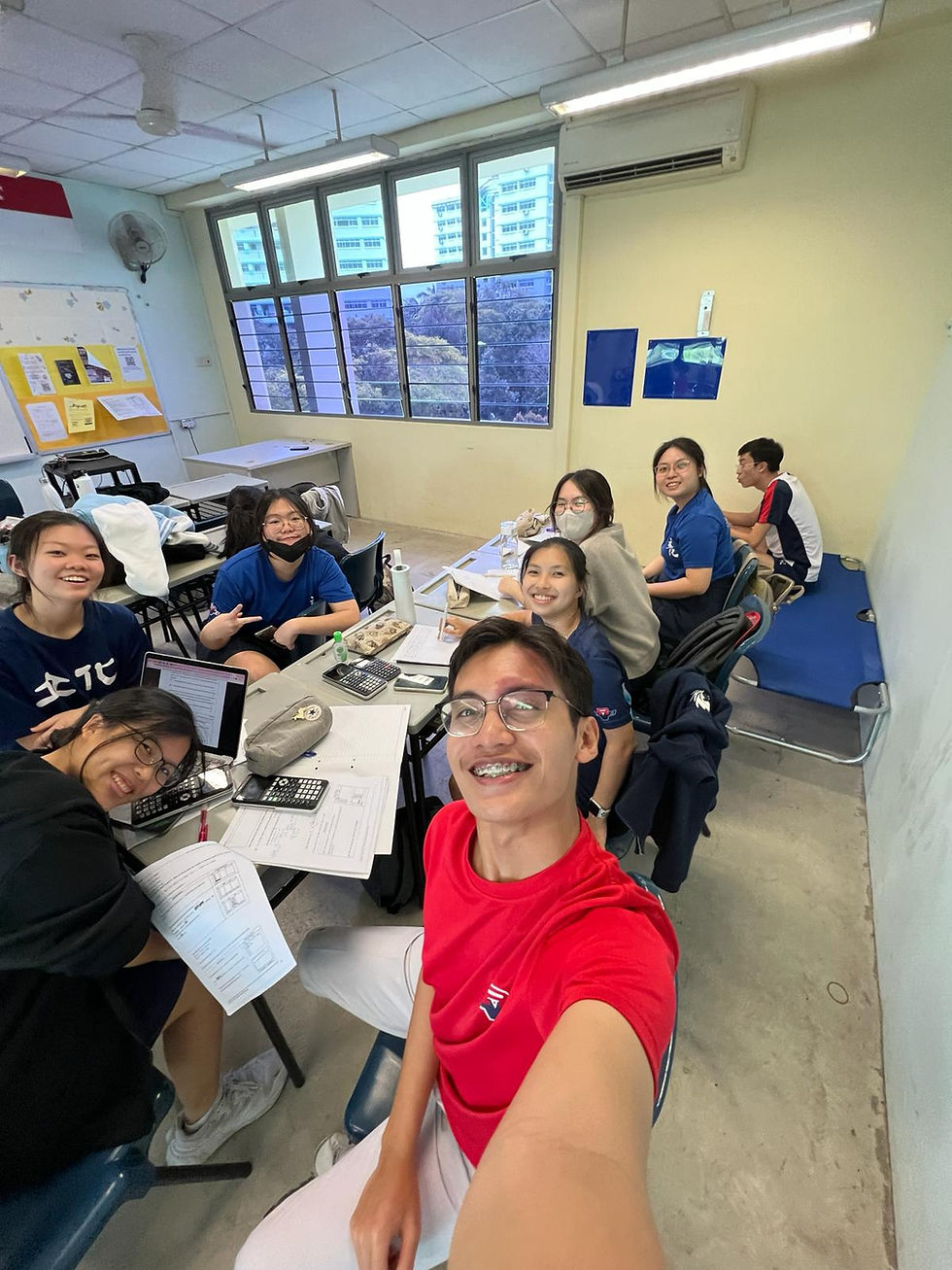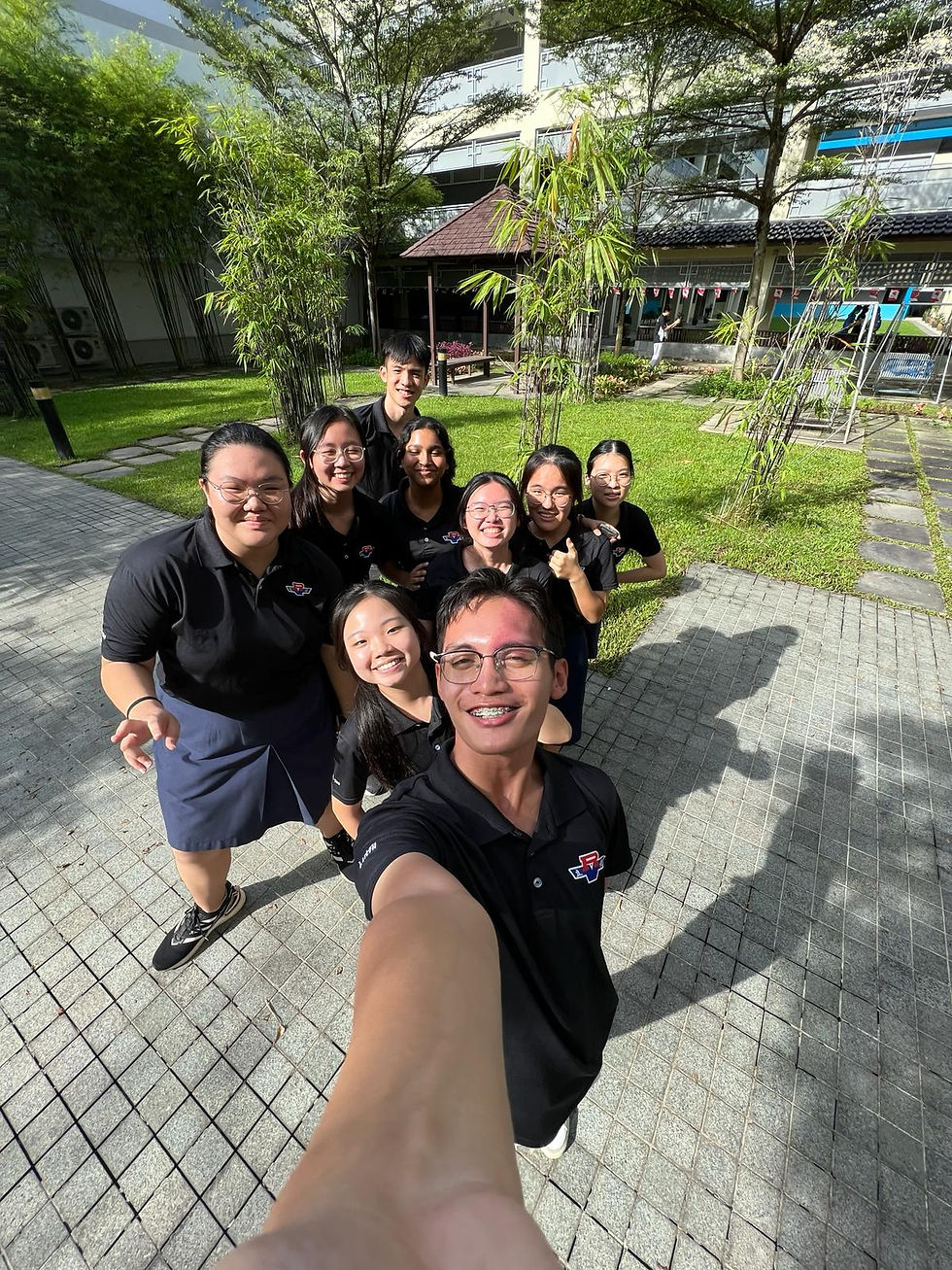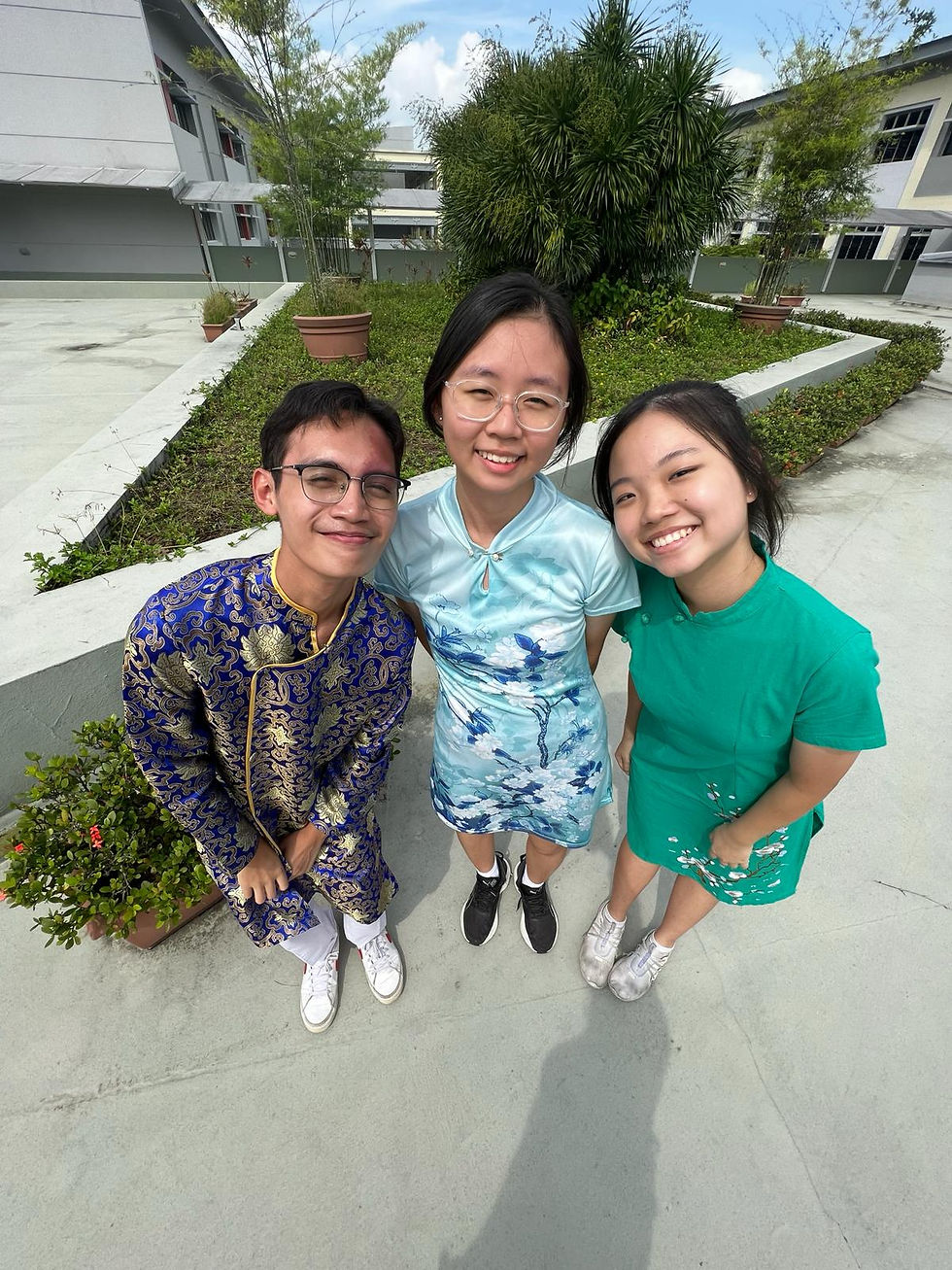

River Valley Student Editorial Club
Jan 284 min read

For RVians, by RVians



By Lim Sing Yang Stanley (23J16)
With the recent release of the A-Level examination results, we’re reminded that one day it will be our turn to sit in the hall, with our hearts racing while waiting for the release of the general performance of the school. Eventually, it will be our turn to receive the booklet that can determine the fate of our future for the coming years. I am certain we all hope to see our efforts culminate one day. Yet, it can be worrying especially in the days leading to the A-Levels.
To alleviate some of the concerns we have in this seemingly short journey to the A-Levels, let’s hear from our J3 seniors, who will be sharing the challenges they faced and how they managed to mitigate them, how to balance academics with their co-curricular commitments and reflecting on what they would have done differently in their two years in Junior College (JC).
Ng Qi Heng(22J18), Lutfil Hadi Bin Iskandar(22J07), and Ganesh S. (22J13) will be sharing their valuable experiences, hoping that their advice can benefit future batches.
Qi Heng: Boredom is a big challenge because there's so much random cool stuff you want to do but you know you should be mugging. The first thing you can do to combat it is to create a post-A-Level bucket list and make it as long as possible because the post-A-level boredom is real. Alternatively, you can take off days like me, because mugging too much is also very unproductive. It is perfectly normal to spend some days not mugging; we weren't made to be cramming 24/7. Thus, try to start early and make a consistent effort. Don't cram content at the last minute and then get burnt out.
Peer pressure is another complex issue because, on the one hand, I wouldn't be here without it. But on the other, too much of it will hurt you. Many people track and compare the number of hours they study, which is funny because it encourages inefficient studying. If your friends want to drag you to consultations, by all means, go with them. But if your friends are showing off their 100 hours of studying, just ignore them because chances are you can achieve similar results in a fraction of the time.
Lutfil: Just like any other J2 student, my A-level preparation was a rather stressful period, especially during the last month before my first paper. However, you simply need to take things one step at a time so that you will not be too overwhelmed. I found that having mini-study groups also helped because it created a mini-support system I could fall back on, which really helped me both emotionally and mentally.

Lutfil studying with his friends!

Lutfil and his classmates with their Math teacher, Mr Ang
Ganesh: I spend the majority of my time juggling external football training, CCA and studies in school. There was very little time which resulted in me neglecting my studies. But thankfully, my procrastination eventually reduced because I created a timetable for myself.
Qi Heng: My studying technique is to make notes online. So before each test, I make the relevant notes and slowly build up my knowledge base. That way I don't start from scratch before each test and can spend more time on my co-curricular (CCA) commitments. Sadly, all my hobbies were just my CCAs 💀, but the same still holds for your other external commitments.

Despite not usually going out with his friends, Qi Heng has forged familial ties with those from his CCA
Lutfil: Being aware of all the tasks that you have to complete and having proper time management is key. I like to list down everything I need to do (i.e. homework, revision, watching online lectures, CCA tasks, etc.) and their deadlines on my phone so that I can visualise my workload for the week. This way, I can plan my time according to how important and urgent the task needs to be completed. To me, it is totally fine to allocate more time to a specific group of tasks for different weeks (i.e. one week is more focused on revision while another week focuses more on CCA tasks), as long as everything gets done on time.

Lutfil with his CCA mates!
Ganesh: Sometimes certain things take priority. For example, during exam periods the main focus would be studying. However, I would also engage in self-training to ensure that I maintain my football skills. This way, I wouldn't completely neglect my other commitments like my CCA.

Team Captains of RVNUSH and Nanyang JC with the referees before the coin-toss to determine the goal-post in which they would be attacking

Pep talk before kick-off
Qi Heng: While half of my answers are in question 1, I do have some other tips such as studying with friends. You can try doing timed practices and then marking them together. You can also try testing each other's content knowledge. Try to rotate subjects each day so you don't get bored. It is also important to take care of your sleep and drink sufficient water. Very cliche, I know. But 50% of the time I'm grumpy is because I'm dehydrated after a 3-hour test.
Lutfil: TAKE QUICK BREAKS WHENEVER YOU NEED ONE! One important thing I realised was that the amount of breaks you take does not need to be in a consistent manner (e.g. every 1 hour). Instead, take a break based on how much “brain power” you have used to complete a certain task. This way, you reduce the risk of feeling exhausted too quickly. To stay motivated, I like to adopt a sense of radical optimism, although I understand that it may not be for everyone.
My mantra for the whole of J2 was “delulu is the solulu” which is a term that means “delusion is the solution to your problems”. Of course, the goal is not to be deluded, but rather to focus on what needs to be done instead of harping on any negative situations. In a sense, you are compartmentalising different aspects of your life so that you can better focus on your work whenever you need to. Additionally, it is something quite funny that my friends and I would laugh about and that would help us destress as well.

Delulu is the solulu
Source: LinkedIn
Ganesh: Have fun, try to always find things to laugh about and mess around with your friends because it will help you get through the day. Also, just frequently research the course you desire to enter so that you are reminded of your goals.
Qi Heng: I would have made more time for my true friends in retrospect as I got too caught up with my CCAs. While it's important to maintain good friendships with those you work with, having a group of friends you can turn to after it's all over is more important.
Lutfil: My biggest regret was having too much self-doubt within me. As a Joint Admissions Exercise (JAE) student with not too much leadership experience, it was a steep learning curve trying to learn the ropes of becoming the president of the Junior College Student Council. I admit that for some time, we started to stagnate and I was not sure what to do. This started to undermine my self-confidence.
If I could do it again, I would have pulled myself together and sought advice from my teachers and peers who were from the High School Student Council about how the whole student council works. I would also have taken note of the different activities held by the different levels. Finding the right time to hold various events we wish to execute can be quite challenging in a school with 6 separate levels on one campus. By doing these, I would have probably been more competent as a student leader and be able to push out more initiatives that the student body would enjoy.
Ganesh: I would have wanted to study even harder to do even better for my A-Levels. I also wished that I had made greater efforts to integrate myself into the RV community as well.
Qi Heng: Your mid-year and preliminary examination grades don't matter. Please still do your best for them, but if anything happens, it really does not mean anything for your A levels.
I’m not 100% sure if this is healthy, but if you want to avoid going to the toilet during the exam, drink less water and use Ricola to ease the dryness. That was probably a bad idea but it worked for me.
Lutfil: Take things slow and take it one thing at a time. You may feel like time is passing so slowly now but you will soon realise that everything will end too quickly. Eventually, when you leave RV, you may even start to miss your group study sessions or being in a lecture theatre with your friends. These are the little things we often take for granted — the heart-to-heart talks in your empty classroom or laughing out loud as you run across the field. We often get so engrossed in our academic life that we tend to forget about the real one.

Cherish the mundane, like talks in the auditorium
I strongly advise all of my juniors to take as many pictures and videos as you can with your friends and cherish every single moment you have with them. Regardless of whether they are filled with happiness, sadness, anger, or excitement. Your JC life will come to an end in the blink of an eye and I hope you have all of the pictures and videos to help you remember all of these wonderful bittersweet moments.

Lutfil with his friends at the canteen

Lutfil meeting the Minister of Education, Mr Chan Chun Sing when he came to our school

Lutfil and his friends in their ethnic costumes during Racial Harmony Day
Ganesh: Enjoy the process, as time passes your grades will slowly get better and you will do well as long as you consistently work hard. To reiterate, I believe that everyone should always find time to have fun.
Qi Heng: I’m going to repeat an old story. In J2, I designed a prototype “ground effect” plane for a research project as part of my internship at the Defence Science Organisation (DSO), appropriately named because it likes to stay on the ground and not fly. Despite many design iterations it still didn't fly, so to save my project I pivoted to doing a computational analysis of my model to prove its efficiency over conventional planes. This ended up winning me several awards at science fairs, all with a plane that never flew.

Qi Heng’s “ground-effect” plane
Moral: If something isn’t working, switch up your methodology. For instance, change your studying technique.

Qi Heng celebrating his last day at DSO with his mentors
Lutfil: I once had a consultation session with one of my teachers where we went through an essay that I wrote. Upon reviewing it, he gave me strong criticism that seemed to undermine my efforts and hurt my feelings. However, I learned a valuable lesson that day: not to take criticism personally but instead look at it from an objective vantage point. I also promised myself to work twice as hard to prove him wrong. Hence, I continued to write more practice essays and seek consultations from other teachers to see different perspectives and have more holistic feedback.
Eventually, I scored an A for that subject in the A-Levels (it was my only A actually) and felt ecstatic. Essentially, you should not listen too much about what other people say about you, no matter who they are. The important thing is that you know what you are capable of and try your best to identify your shortcomings and continuously improve yourself. Remember, when we are faced with criticism, we just need a little more time and a little more help, that’s all <3.
Overall, it is refreshing to hear about our seniors' experiences, with many responses resonating with each other and sharing the same sentiments. I am certain that they hope we learn from their experiences and approach the A-Levels with the advice they have imparted.
Moreover, realising that many of them have faced the same challenges that we have, reassures us that the setbacks that we have faced are normal in our journey to succeed and conclude our time in RV. We hope readers perceive failure as a stepping stone to improvement, rather than just a flaw.
Despite the short period we have before the A-levels, the learning process we undergo, the bonds we have formed, and our holistic growth all help to elongate this seemingly short journey.


Comments